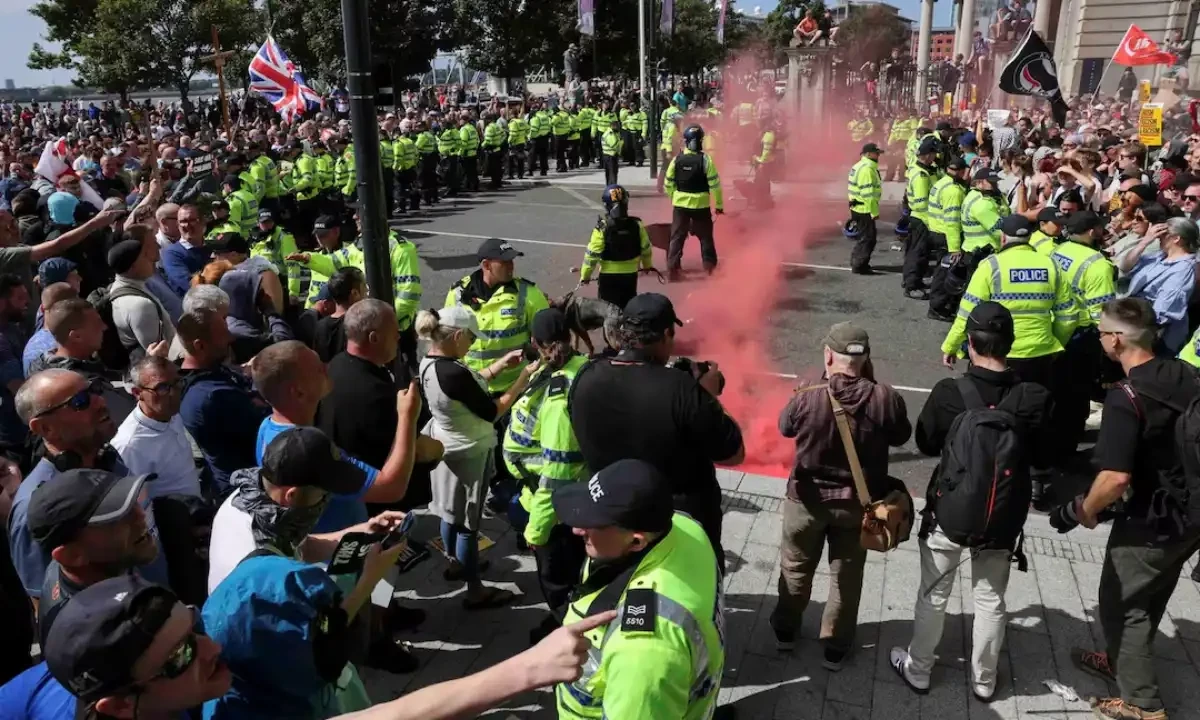Rioting
On Saturday, violent disorder erupted across several British cities, marking the most extensive rioting in the UK in 13 years. The chaos unfolded in the wake of the tragic murder of three young girls in northwest England.
The disturbances followed the spread of false information on social media claiming that the suspect in Monday’s knife attack at a children’s dance class in Southport was a radical Muslim migrant. In reality, the suspect, Axel Rudakubana, is a 17-year-old British citizen.
The rioting saw hundreds of anti-immigration protesters clashing with counter-protesters in various cities, including Liverpool, Bristol, Hull, and Belfast.
The violence was characterized by arson, looting, and significant property damage. The protests were fueled by misinformation and heightened tensions surrounding immigration and religious issues.
In Liverpool, the scene of intense clashes, two police officers were hospitalized with suspected facial fractures, and another officer was assaulted after being pushed off his motorbike.
The disorder involved around 750 anti-immigration protesters and a similar number of counter-protesters. At least two shops in Liverpool were vandalized and looted amidst the turmoil.
Bristol also experienced significant unrest, although anti-racist protesters outnumbered the anti-immigration groups.
Television footage captured confrontations between these groups and police in riot gear. Similarly, in Belfast, there were reports of property damage, including at least one business that was set on fire.
Rahmi Akyol, owner of a café in Belfast, expressed his dismay after his establishment was attacked by rioters armed with bottles and chairs. “I’ve lived here for 35 years. My kids and my wife are from here. I don’t know what to say; it’s terrible,” Akyol said, standing outside his damaged café.
Across Britain, police have made numerous arrests related to violent disorder, burglary, and criminal damage.
Extra officers have been deployed in affected cities, and mosques nationwide have been advised to enhance security following a recent attack on a mosque in Southport.
Prime Minister Keir Starmer, facing his first major challenge since his election a month ago, has condemned the violence, labeling it as the work of far-right extremists.
He has expressed support for the police’s efforts to manage the disorder and held discussions with senior ministers regarding the situation.
This outbreak of violence is reminiscent of the last major riots in Britain, which occurred in 2011 following the police shooting of a Black man in London.
On Friday night, in Sunderland, anti-immigration demonstrators escalated their protests by throwing stones at police, overturning vehicles, and setting a car alight near a police station.
Chief Police Superintendent Mark Hall described the events as “unforgivable violence and disorder,” emphasizing the severity of the situation. Further protests were planned for Sunday, raising concerns about continued unrest.
I am a dynamic professional, specializing in Peace and Conflict Studies, Conflict Management and Resolution, and International Relations. My expertise is particularly focused on South Asian Conflicts and the intricacies of the Indian Ocean and Asia Pacific Politics. With my skills as a Content Writer, I serve as a bridge between academia and the public, translating complex global issues into accessible narratives. My passion for fostering understanding and cooperation on the national and international stage drives me to make meaningful contributions to peace and global discourse.










